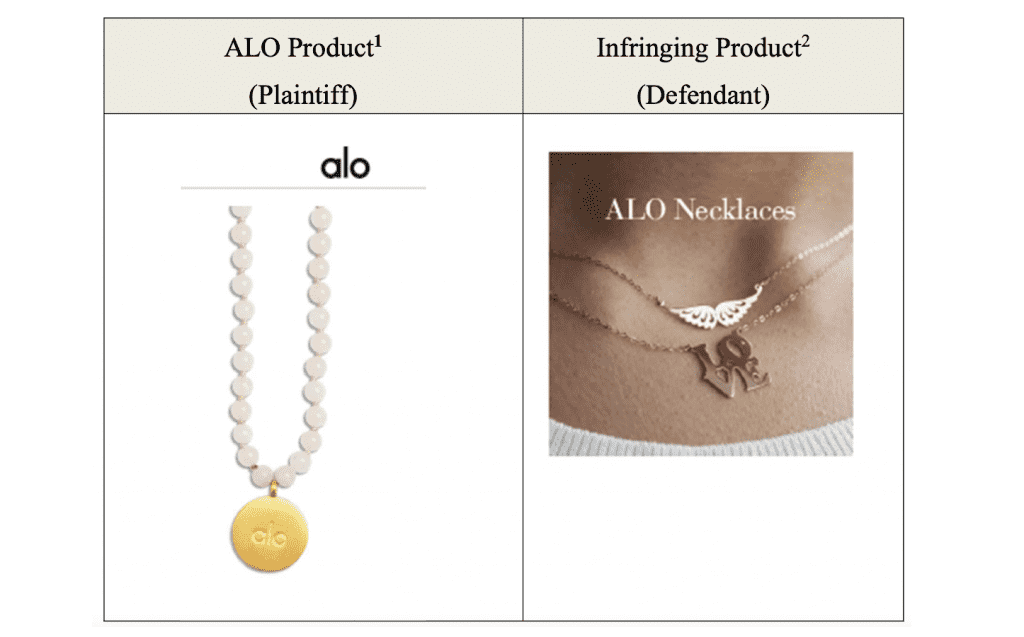ALO is taking on an unaffiliated jewelry company for allegedly co-opting its name in an attempt to piggyback on the appeal of the celebrity-favored yogawear brand and its offerings. According to the lawsuit that it filed on April 1 in a federal court in California, ALO asserts that Czech Republic-based ALO Diamonds is on the hook for trademark infringement, false designation of origin, and unfair competition in connection with its use of the ALO name for a collection of jewelry products, which ALO claims is likely to cause confusion among consumers and which is causing it to “suffer substantial and irreparable injury, loss, and damage to its rights.”
In the newly-filed complaint, Los Angeles-based ALO alleges that it has marketed and sold products under the “alo” brand since 2006 and “due to continuous, extensive advertising, promotion and sales,” it has developed “considerable goodwill and reputation throughout the United States and abroad.” In particular, the “well-known athleisure, yoga, and health and wellness brand” asserts that it has sold “millions of dollars’ worth of products under the ALO trademarks and has expended a great deal of time and effort and resources in the promotion and advertisement of its products sold and offered for sale under the ALO marks.”
Against that background, ALO argues that Alojz Ryšavý-founded ALO Diamonds is offering up products that are “identical, closely related, and/or complementary to the goods ALO offers or intends to offer under the ALO marks” by way of its collection of diamond jewelry. (Are diamonds/gold jewelry offerings closely related to and/or in the zone of natural expansion of yogawear?)
ALO claims that the like-named jewelry company has been aware of its rights in/registrations for the ALO name since July 2018 when ALO initiated proceedings with the U.S. Patent and Trademark Office (“USPTO”)’s Trademark Trial and Appeal Board to cancel ALO Diamond’s trademark registrations for “ALO DIAMONDS,” “ALO,” and “ALO JEWELRY,” which were registered by the USPTO between 2013 and 2014 for use in connection with jewelry products and “on-line retail store services” of jewelry. In its complaint, ALO points to its registrations for ALO for use on men’s and women’s “clothing, namely, pants, shirts, vests, jackets, hooded jackets,” as well as “sports bras;” and ALO for use on “Athletic bags,” “Headbands; Leg warmers; Scarves; Tights,” and for “Yoga mats.” The company also points to a pending trademark application for registration for ALO for use in connection with “Retail store and online retail and wholesale store services featuring clothing, apparel accessories, yoga equipment, bags, footwear, headwear, books.”
(The cancellation proceedings, which ALO initiated on the basis of abandonment, arguing that ALO Diamonds is not actually using its mark in commerce in the U.S., have been on hold since 2020 on the basis that the parties have been “actively engaged in negotiations for the settlement of this matter.”)

With the foregoing in mind, ALO argues in its lawsuit that ALO Diamonds is acting “willfully and in bad faith” in infringing in its rights in the ALO marks, “misleading the public into associating certain jewelry products distributed by ALO DIAMONDS ON-LINE with ALO; and harm[ing] ALO’s goodwill and business reputation.” It is seeking injunctive relief, as well as monetary damages, including ALO Diamonds’ profits and all actual damages trebled, reasonable attorney’s fees, costs, and prejudgment interest. (ALO is also seeking an order that the defendant be ordered to deliver up for destruction “all products and any other materials in [its] possession bearing the ALO marks and any mark containing the word ‘ALO’ or that is otherwise confusingly similar to the ALO marks.”)
While ALO does offer up a limited selection of beaded jewelry, which means that it maintains some rights in its name for use in connection with jewelry (trademark rights, after all, exist as a result of use of a mark in/in connection with specific types of goods or services), it will be interesting to see whether ALO can show that consumers are likely to be confused about the source/nature of ALO Diamonds’ offerings and whether the parties are in some way affiliated. (It does not provide any hints by way of the complaint.)
As for ALO Diamonds, it might argue that it should be shielded from liability on the basis that it does not actually sell its products in the U.S., which is what Chinese sneaker-maker New Bunren (unsuccessfully) claimed in response to the lawsuit filed against it by New Balance. In that case, which was filed in federal court in Delaware in 2017, New Bunren argued that while its sneakers were “marketed via the www.new-bunren.com website,” it should not be on the hook for trademark infringement and dilution because it did not transport or sell them in the U.S., which it cited as the legal standard for determining “use in commerce.”
Unpersuaded, the court held that the standard for infringement is quite a bit lower, and was met in the case based on the fact that while New Bunren may not have shipped or sold any sneakers in the U.S., and also did not include “any pricing information or purchasing instructions on [its] website,” New Bunren, nonetheless, “did provide a ‘contact us’ form, [and] … at one point had an Alabama phone number that consumers could call if they were interested in purchasing the products.” (In the case at hand, ALO Diamonds provides an email address as a contact point, along with a Czech mailing address.)
According to the judge, “This leaves open the possibility that its products could have been sold through the internet and directly shipped to a consumer,” and thus, meets the “in commerce” requirement for infringement. Moreover, it is worth noting that the Lanham act also creates liability for “offer[s] for sale” or “advertising,” which could occur without products being sold or shipped in the U.S. As such, the court in that case determined that the marketing of products online in the U.S. can be sufficient to create liability for trademark infringement and dilution.
A rep for ALO Diamonds was not immediately available for comment about the ALO lawsuit.
The case is Alo, LLC v. ALO Diamonds On-Line, S.R.O. et al, 2:22-cv-02173 (C.D.Cal.)













